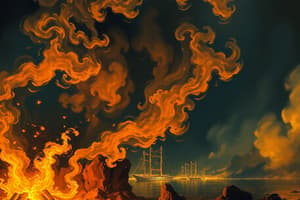Podcast
Questions and Answers
Which type of combustion is characterized by the fuel and oxidizer diffusing towards each other in the combustion chamber?
Which type of combustion is characterized by the fuel and oxidizer diffusing towards each other in the combustion chamber?
- Diffusion Combustion (correct)
- Complete Combustion
- Partial Combustion
- Autogenous Combustion
What is another term for autogenous combustion, where the heat from the reaction sustains the process without external sources?
What is another term for autogenous combustion, where the heat from the reaction sustains the process without external sources?
- Self-Sufficient Combustion (correct)
- Internal Combustion
- Unassisted Combustion
- Independent Combustion
In which type of combustion do unburned fuel and partially combusted products lead to the emission of pollutants?
In which type of combustion do unburned fuel and partially combusted products lead to the emission of pollutants?
- Autogenous Combustion
- Diffusion Combustion
- Partial Combustion (correct)
- Complete Combustion
What are the main products produced in complete combustion?
What are the main products produced in complete combustion?
Why is understanding the various types of combustion important?
Why is understanding the various types of combustion important?
Which type of combustion is common in gas-fired stoves and internal combustion engines according to the text?
Which type of combustion is common in gas-fired stoves and internal combustion engines according to the text?
Which type of combustion involves the fuel and oxidizer being mixed together before the reaction begins?
Which type of combustion involves the fuel and oxidizer being mixed together before the reaction begins?
What is an example of a fuel that undergoes heterogeneous combustion?
What is an example of a fuel that undergoes heterogeneous combustion?
In which type of combustion do the fuel and oxidizer mix together before entering the combustion chamber?
In which type of combustion do the fuel and oxidizer mix together before entering the combustion chamber?
Which combustion process involves various steps like vaporization, pyrolysis, and gasification before the actual reaction?
Which combustion process involves various steps like vaporization, pyrolysis, and gasification before the actual reaction?
What type of combustion results in a hot, clean flame due to rapid and efficient reaction?
What type of combustion results in a hot, clean flame due to rapid and efficient reaction?
Flashcards are hidden until you start studying
Study Notes
Understanding Combustion: A Closer Look at Various Combustion Processes
Combustion is a fundamental chemical process where a fuel reacts with an oxidizing agent, usually oxygen, releasing energy in the form of heat and sometimes light. This interaction between fuel and oxidizer leads to the formation of other chemicals, which can be gases, liquids, or solids. In this exploration, we'll delve into the various types of combustion processes that occur in our everyday lives.
Homogeneous Combustion
In homogeneous combustion, the fuel and oxidizer are mixed together before the reaction begins. Examples include the burning of gases like methane and hydrogen, which produce combustion products like carbon dioxide and water vapor. This type of combustion is common in gas-fired stoves and furnaces, as well as internal combustion engines.
Heterogeneous Combustion
In heterogeneous combustion, the fuel and oxidizer are in different phases (e.g., solid, liquid, or gas). For instance, wood, coal, and oil are combusted as solids, while gasoline vaporizes before igniting. This type of combustion is more complex than homogeneous combustion, as it involves multiple steps, such as vaporization, pyrolysis, and gasification, before the actual combustion reaction takes place.
Premixed Combustion
In premixed combustion, the fuel and oxidizer mix together before entering the combustion chamber. This ensures that the reaction occurs rapidly and efficiently, producing a hot, clean flame. This type of combustion is common in gas-fired stoves and internal combustion engines.
Diffusion Combustion
In diffusion combustion, the fuel and oxidizer are mixed together in the combustion chamber. The reaction occurs as the fuel and oxidizer diffuse towards each other, creating a hot, turbulent flame. This type of combustion is common in flames produced by the burning of solid fuels, such as wood and coal.
Autogenous Combustion
Autogenous combustion, also known as self-sustaining combustion, occurs when the heat produced by the combustion reaction is enough to maintain the combustion process, without the need for external heat sources. This type of combustion is common in solid fuel combustion, such as the burning of wood and coal in fireplaces and stoves.
Partial Combustion
Partial combustion, also known as incomplete combustion, occurs when the fuel does not react completely with the oxidizer. This results in the formation of unburned fuel and partially combusted products, which can lead to the emission of pollutants and the production of toxic substances.
Complete Combustion
Complete combustion occurs when the fuel completely reacts with the oxidizer, producing only carbon dioxide and water vapor as products. This type of combustion is ideal and results in minimal pollution and emissions.
The Importance of Combustion
Combustion is a critical process that reaches far beyond the common understanding of a simply burning match or a car engine. It is essential for the generation of heat and electricity, the production of steam, and the synthesis of chemicals, all of which underpin modern society. The study of combustion is not only of academic interest, but also of practical importance in fields such as energy production, transportation, and environmental protection.
Understanding the various types of combustion is important for optimizing combustion processes, minimizing pollution and emissions, and promoting sustainable energy production. With the increasing global demand for energy and the need to reduce our carbon footprint, research into combustion processes and the development of new combustion technologies will continue to be a vital area of scientific inquiry.
Studying That Suits You
Use AI to generate personalized quizzes and flashcards to suit your learning preferences.




